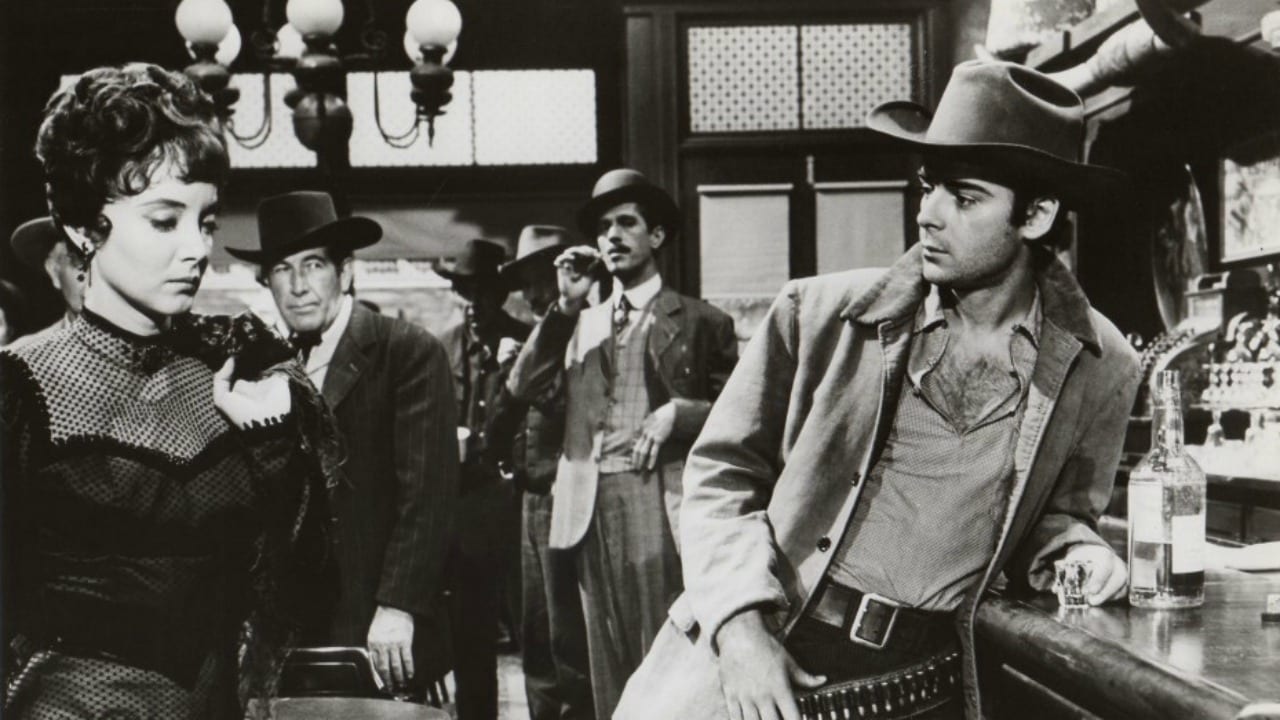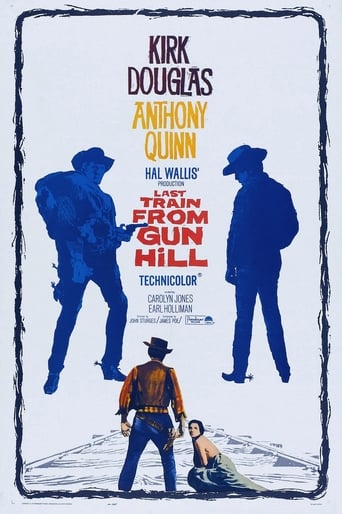



Strong and Moving!
Memorable, crazy movie
Horrible, fascist and poorly acted
Close shines in drama with strong language, adult themes.
View MoreIt was one early western DVD release around 2003 and l got my copy right way,this movie l'd watched in 1981 on TV and the possibility to have it eternally amazed me,this solid and tense western have all elements to make a good picture,a strong reason to make justice even against his best friend...a fine supporting casting and a pretty woman who decided to do a right choice...suspenseful and remarkable western compatible the High Noon! Goof: When the boy was running back home,sometimes he is up river and sometimes down the river...pay attention..Resume: First watch: 1981 / How many: 4 / Source: TV-DVD / Rating: 8.25
View MoreTwo fine actors, Kirk Douglas and Anthony Quinn, at the top of their games. They were very different men but they had one thing in common: neither of them treated making movies as anything other than a means of earning a living. Quinn was reserved by Hollywood standards. He made no public service announcements or any such thing. Even his autobiography is sluggish. Quinn started in bit parts, usually as villains because of his dark looks. I think he played a romantic lead once in his career. Ot wasn't so much a career as a business, yet, he turned in some magnificent performances, as in "Viva Zapata." In contrast, Kirk Douglas' "Ragman's Son" is one of those autobiographies that is so unusually frank that it unwittingly exposes the author's weaknesses because he simply doesn't see them as weaknesses. He seemed to put a dollar sign before most of his transactions with others. He lacked empathy and treated some helpless people with the utmost cruelty. He ridiculed the notion of movies being "art." Yet, he too was memorable in many of his films, especially as a man possessed by some kind of Dybukk, as in "The Juggler" and "Champion." The guilty son, Earl Holliman, was a staple of films in the 1950s and his frequent appearances always puzzled me because the poor guy is fundamentally uninteresting. He hits his marks and recites his lines but he always sound as if he's whining about something. His features are equally dull, a dished face and two big ears. Caroyn Jones is the lady in the case, bitter, cynical, but won over at the end by Douglas' rectitude.There is effective direction by John Sturges. Sometimes it's subtle but mostly functional. All the usual conventions of the traditional Western are followed. Every man wears a pistol strapped to his leg and there is danger everywhere, but, as in other Sturges flicks, no one is muddy. Ranches all about but no one is muddy. Nor do we see anyone on Quinn's cattle ranch doing anything with cattle. Sturges seemed most attracted to town Westerns, where a man could get a drink at a decent saloon and find a game of Red Dog. Every man, no matter his state, has been shaved closely by the studio barber.The story in some ways resembles "3:30 To Yuma" but it's more taut, less mechanical. Earl Holliman is the weak wastrel son of cattle baron Quinn. He pursues and rapes a beautiful Indian woman, not knowing that she's the wife of Douglas, the Marshall of a nearby town. Douglas discovers the culprit's identity and shows up at the ranch to take him back. Quinn and Douglas are old friends and Quinn tries to dissuade Douglas from making the arrest. The streets line with Quinn's men ready to shoot Douglas as he tries to board the train with his prisoner and the tension grows. Come to think of it, at a slightly higher level of abstraction, it's "Rio Bravo", in which the sheriff is holed up with a prisoner guilty of murder and the whole town is waiting to gun him down.It's a tragic situation and a moving one. Quinn is in the more difficult position. He doesn't want Douglas killed but neither can his pride allow his son to be hanged. In the end, justice is done but a price is paid for it.
View MoreIf you consider the basic plot summary - murder, revenge, Marshall who is friends with cattle baron whose son is part of the problem, one man against them all - you might think that this would be a cookie cutter western.But it rises above the pack with the calibre of the acting, the subtle differences in the story and the quality of the production.Douglas is in fine form - physically and in talent. Quinn is the cattle baron portrayed without the b-grade script recital we often get from such roles.Better than the original 3:10 to Yuma, and miles better than the remake with that awkward and ludicrous run-to-the-train scene.This is cowboy film making as it should be.
View MoreTwo best friends become bitter enemies out of revenge because of the bullying nature of one of their sons. Kirk Douglas (as a marshal from another town) and Anthony Quinn (as the self-made wealthy rancher who runs his town) are the old friends who come at odds when Quinn's son (Earl Holliman) brutally rapes and murders Douglas's wife as his son hears her screams while escaping to get help. That in itself is a plot for a movie, but here, the storyline concentrates on Douglas's revenge. He instantly recognizes the saddle which belonged to Quinn after the son wisely steals Holliman's horse. You can see the anguish in Quinn's face as he realizes the extent of his son's brutality, but is forced to try and get Douglas to change his plans for revenge. Douglas, on the other hand, is first lightly seen explaining his history with Quinn to a bunch of town kids as the son rides in, horrified by what he just saw. Douglas goes from calm, cool, and collected to shocked, saddened, and saddled with revenge. His issue isn't with Quinn; It's with Holliman and the buddy who committed the crime. But as it becomes clear that the two old friends cannot come to terms with each other's ordeals, the tension gets tighter and the performances really explode.The always wonderful Carolyn Jones gives a really outstanding fleshed-out performance as a self-described "woman who was born in trouble", a card dealer who is obviously Quinns' mistress. She obviously is modeled on "High Noon's" Katy Jurado. You know from the moment she sits down right next to Douglas on his train into Gun Hill that she knows more than she is letting on, and will provide much intrigue as the film goes on. Fortunately, there is no namby-pamby Grace Kelly character there to add an unnecessary overly fragile woman to the plot. With Douglas and Quinn, there is enough to focus on, and Jones provides enough spark to go around. The film does not lack on tension; Once Douglas gets Holliman in his grasp (handcuffed to a hotel bed), Quinn's men storm around waiting for an opportunity to move in. Douglas shows intelligence, compassion, yet a definite sense of justice in his decision to have Holliman tried for rape and murder rather than kill him outright. Outstanding photography, music and direction are also standouts. This should be noticed as one of the greatest westerns ever made that even non-western fans can enjoy.
View More